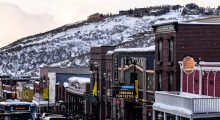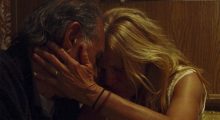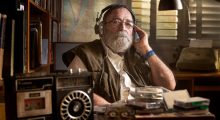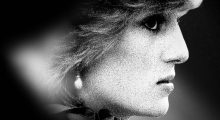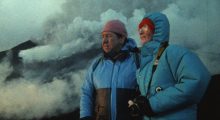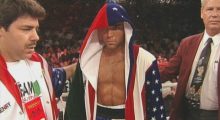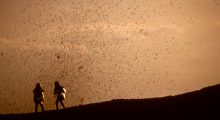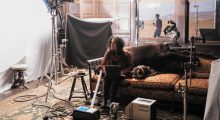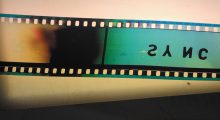6582 Results for “production”
-
The 2022 Sundance Question: What Aspect of Your Filmmaking Did You Have to Reinvent?

Each year Filmmaker asks all the incoming feature directors at Sundance one question. (To see past years’ questions and responses, click here.) This year’s question: The last two years have prompted much contemplation and reconsideration of the reasons why we make our films as well as the ways in which we make them. What aspect of your filmmaking—whether in your creative process, the way you finance your films, your production methodology or the way you relate to your audience—did you have to reinvent in order to make and complete the film you are bringing to the festival this year? “Jumping […]
by Filmmaker Staff on Jan 20, 2022 -
“Acting as Though Something Will Happen Can Take One Darn Close to Doing It” | Max Walker-Silverman, A Love Song

The last two years have prompted much contemplation and reconsideration of the reasons why we make our films as well as the ways in which we make them. What aspect of your filmmaking—whether in your creative process, the way you finance your films, your production methodology or the way you relate to your audience—did you have to reinvent in order to make and complete the film you are bringing to the festival this year? This script had been in my head for a long time, but I didn’t put pen to paper until April of 2020. I’d just graduated from […]
by Filmmaker Staff on Jan 20, 2022 -
“Jumping and Hugging When a Scene Suddenly Works Amazingly Is Always Much More Fun in the Same Room” | Alon Schwarz, Tantura

The last two years have prompted much contemplation and reconsideration of the reasons why we make our films as well as the ways in which we make them. What aspect of your filmmaking—whether in your creative process, the way you finance your films, your production methodology or the way you relate to your audience—did you have to reinvent in order to make and complete the film you are bringing to the festival this year? I think the biggest challenge was the communications cycle with the offline video editors when not working locally. I started working remotely as my first editor, […]
by Filmmaker Staff on Jan 20, 2022 -
“We Wanted to Target an Audience Not Necessarily Interested in the Royal Family”: Editors Jinx Godfrey and Daniel Lapira on The Princess

From the beginning, director Ed Perkins knew he wanted to tell Princess Diana’s story without any retrospective interviews and instead rely purely on archival material. That’s a rich archive, consisting of thousands of hours of footage, meaning the editors would need to choose among countless potential approaches or narrative threads. Below, editors Jinx Godfrey and Daniel Lapira discuss what drew them to the film and how they managed to whittle thousands of hours of footage into a 104-minute feature film. Filmmaker: How and why did you wind up being the editor of your film? What were the factors and attributes […]
by Filmmaker Staff on Jan 20, 2022 -
“The Pandemic Sparked a Deeper Contemplation Into Our Creative Process” | Sara Dosa, Fire of Love

The last two years have prompted much contemplation and reconsideration of the reasons why we make our films as well as the ways in which we make them. What aspect of your filmmaking—whether in your creative process, the way you finance your films, your production methodology or the way you relate to your audience—did you have to reinvent in order to make and complete the film you are bringing to the festival this year? Fire of Love is the first archival film I’ve ever directed—my previous two independent films I directed were primarily vérité. Fire of Love producer Shane Boris, assistant producer […]
by Filmmaker Staff on Jan 20, 2022 -
“It Was Really Important That I Was Able to Lean Into the Intimacy of Interviewing My Subjects and Not Just Rely on Archival Footage” | Eva Longoria Bastón, La Guerra Civil

The last two years have prompted much contemplation and reconsideration of the reasons why we make our films as well as the ways in which we make them. What aspect of your filmmaking—whether in your creative process, the way you finance your films, your production methodology or the way you relate to your audience—did you have to reinvent in order to make and complete the film you are bringing to the festival this year? Given the nature of La Guerra Civil, it was really important that I was able to lean into the intimacy of interviewing my subjects and not […]
by Filmmaker Staff on Jan 20, 2022 -
“I Came Out of This Process With a Refreshed Perspective on Mortality”: Editors Erin Casper & Jocelyne Chaput on Fire of Love

Two of the best known volcanologists, Katia and Maurice Krafft—are arguably as well known for having died in an expedition on Japan’s Mount Unzen, but Fire of Love, a documentary by Sara Dosa that makes use of the footage shot by the couple, turns away from the easy tragic narrative to instead shine a light on the love they shared for their work as well as for each other. Editors Erin Casper and Jocelyne Chaput explain how they put together a film from footage that was often difficult to parse and why they took inspiration from the French New Wave. […]
by Filmmaker Staff on Jan 20, 2022 -
On the Journey: The Power of the Dog Producer Tanya Seghatchian

As a young woman, Tanya Seghatchian remembers laughing, crying and suffocating through Jane Campion’s early work, a cinematic compass she had internalized by the time she began her first job for the BBC—researching a two-part TV documentary about John Ford, pioneer of the American western. Over the years, Seghatchian’s trajectory expanded across genres and scales, from coproducing the first two Harry Potter films and executive producing more than 20 episodes of The Crown to producing Pawel Pawlikowski’s My Summer of Love and Cold War, the latter of which was nominated for three Academy Awards, including Best Foreign Language Film, in […]
by Taylor Hess on Jan 18, 2022 -
Pedagogical City Hopping: the DocNomads Film School
“What if we create a curriculum for a school we’d like to attend ourselves?” That question was the foundation for a group of five educators who gathered in Lisbon, Portugal, in 2011 to brainstorm an entirely new two-year Masters-level film program dedicated to documentary production. The partners came from Lusófona University in Lisbon; the University of Theatre and Film Arts in Budapest, Hungary; and LUCA School of Arts/College Sint Lukas in Brussels, Belgium. Vítor Candeias, who represented Lusófona University in designing the program and is a course director as well as a documentary filmmaker, says that the original idea was […]
by Holly Willis on Jan 18, 2022 -
Positive Endeavor: CPC London on Striking Affordable 35mm Prints

In February 2020, I attended a screening of Josh and Benny Safdie’s Uncut Gems at Quentin Tarantino’s New Beverly Cinema, a venue widely known and admired among film enthusiasts for its devotion to celluloid exhibition. I was awestruck by the exquisite 35mm presentation of a movie I had previously—like everyone else in the world—only seen projected digitally, and even more astonished when I spoke with the Safdie brothers afterward and learned how simple it was for them to strike a flawless 35mm print from their digital source. Back in 2005, when I directed Bad Reputation, a microbudget horror movie shot […]
by Jim Hemphill on Jan 18, 2022
